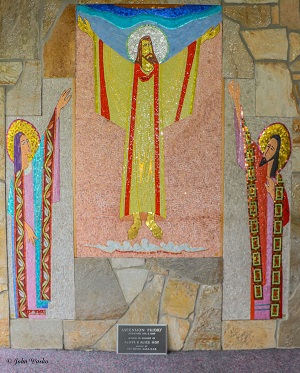Personal Prayer
Freddie Nikoloff
"Be happy at all times; pray constantly; and for all things give thanks to God because this is what God expects you to do in Christ Jesus. Never try to suppress the Spirit or treat the gift of prophecy with contempt; think before you do anything; hold on to what is good and avoid every form of evil. May the God of peace make you perfect and holy; and may you all be kept safe and blameless, spirit, soul and body, for the coming of our Lord Jesus Christ. God has called you and he will not fail you. Pray for us, my brothers." (1 Thess 5: 16-24)
The Importance of Prayer
Prayer opens the floodgates of grace, the experience of a lifetime.
The essence of prayer is a dialogue of the individual with God. As children of God we know he addresses each of us from within our souls.
Learning to pray either vocally or wordlessly is a gradual learning process. It is important to make the effort to develop a discipline about keeping up a regular practice of prayer and meditation. We pray in order to develop our relationship with God.
All Christians are exhorted to pray and of course so are Benedictine oblates, perhaps with more intensity.
Prayer in the Bible and the Rule of St. Benedict
The Scriptures of both the Old Testament and New Testament stress the necessity of prayer.
As long as Moses remained in prayer, the Amalekites were losing the battle. When he stopped praying, Amalek was winning (Exodus 7: 8-17). Finally, with Aaron and Hur's help, Israel's enemy was defeated. It was prayer that made this miracle possible.
Hosea emphasized that prayer must be an interior stance of the believer, that it cannot be replaced by ritual sacrifice. "For it is love that I desire, not sacrifice." According to Hosea, "God will be to us like the rain, like spring rain that waters the earth."
Throughout Luke it is assumed that prayer is central to our relationship with God. Among the parables, the one on the Pharisee and the tax collector tells us that true prayer is an acknowledgement of the fundamental truth of our relationship to God. We depend on Him for everything, above all, forgiveness and grace.
Our principal model for prayer is Jesus, who prayed to his Father throughout His life. The Scriptures relate numerous examples: Before starting his ministry, Jesus was baptized by John, the Baptist. Afterward, while Jesus was at prayer, the Holy Spirit came down upon Jesus and a voice came down from heaven, "You are my beloved Son. With you I am well pleased" (Lk 3: 21-22). After the last Supper, Jesus went to the Mount of Olives to pray (Lk 22). During his passion, Jesus prays, "Father forgive them, they know not what they do" (Lk 23: 46). While dying, Jesus prayed and cried out, "Father, into your hands I commend my spirit" (Lk 23: 46).
The Prayer of Lectio Divina
St. Benedict devotes chapter 20 in his Rule to reverence in prayer. We are to lay our petitions before the Lord God of all things with utmost humility and sincere devotion. God regards our purity of heart and tears of compunction, not our many words.
Depending on our personal circumstances, a most enriching and fruitful form of prayer is praying the Scriptures, or lectio divina. The prayerful reading of the Scriptures (and prayerful reflection on other books, on our experience or even on our own conscience) develops through four steps: reading, pondering, conversing with God and contemplation. These steps lead on to the depths of prayer from an initial meeting in faith with the Word of God.
1. In prayerfully reading (Lectio) a passage, we are receiving the revelation of God. 2. In pondering (Meditatio) the text in faith, we raise questions about it, compare it with other passages and relate it to our own life. 3. In conversing with God (Oratio) we express to God the feelings of our heart: worship and praise; thanksgiving; intercession; sorrow; love; trust; or surrender. 4. We contemplate (Contemplatio) as friend to friend, without words by simply being with the Lord in silence and letting Him fill our heart and mind.
Spending time with our Lord in personal prayer strengthens us on our spiritual journey to our ultimate goal. It is a part of daily seeking God, which St. Benedict stresses so much in his Rule.
"Let them prefer nothing whatever to Christ and may he bring us all together to everlasting life" (RB 72).


